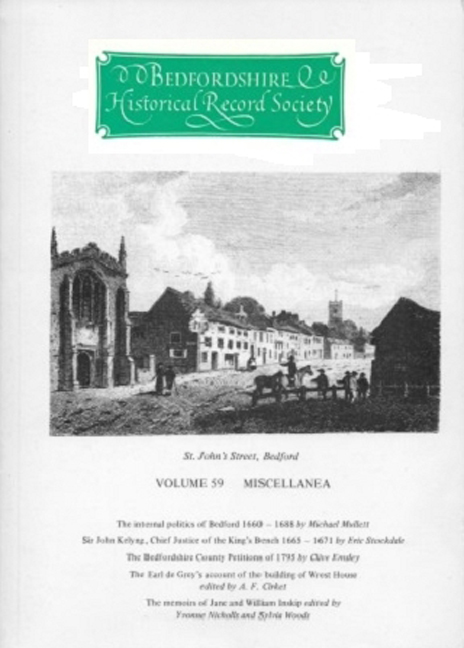Book contents
Sir John Kelyng, Chief Justic of the King’s Bench, 1665 — 1671
Published online by Cambridge University Press: 15 February 2024
Summary
Sir John Kelyng is associated in Bedfordshire with John Bunyan, as he presided at the Quarter Sessions on that fateful day in January 1661 when the tinker was sent to Bedford prison for noncomformity. Kelyng was a serjeant living at Sou thill at the time, and not a full time judge, and it is doubtless for that reason, and because the trial itself was of no legal interest at the time, that his participation in it went unnoticed elsewhere, and received no mention in the biographical sketches of Kelyng contained in Lord Campbell's Lives of the Chief Justices of England, or in Edward Foss's The Judges of England or in the Dictionary of National Biography.
Kelyng was born in Hertford in 1607 and baptized at All Saints’ on 19 July, and was admitted to the Inner Temple on 24 January 1624. The Inn's Admission Records show that he was the son of John Keeling of Hertfordshire, “one of the fellows of the House”, and indeed his father was one of his sponsors. The father had been admitted to< the Inn eight years earlier, on 13 October 1615, and one of his sponsors had also been a John Keelinge. Whether this was his father, or an uncle, one cannot say, but this earlier John Keelinge had been admitted on 8 November 1609. He was described as being “of New Castle, Staffordshire, and late of Clement's Inn”.
The father of our John Kelyng lived in Hertford for many years, and so did young Kelyng before the Civil War. The son was called to the Bar on 10 February 1632 and, like his father, practised in the forest courts.The father was clearly prosperous, for one rate assessment in about 1630 showed him as owner of “a messuage with an orchard & close in his own tenure”, and of nine other properties in Hertford. On 8 May 1637 both father and son were assessed for “a rate made for the buylding & erecting of two pesthouses & for the daylie relief of those persons that have or shall be visited with the foulness of the plague”.
- Type
- Chapter
- Information
- Miscellanea , pp. 43 - 54Publisher: Boydell & BrewerFirst published in: 2024

